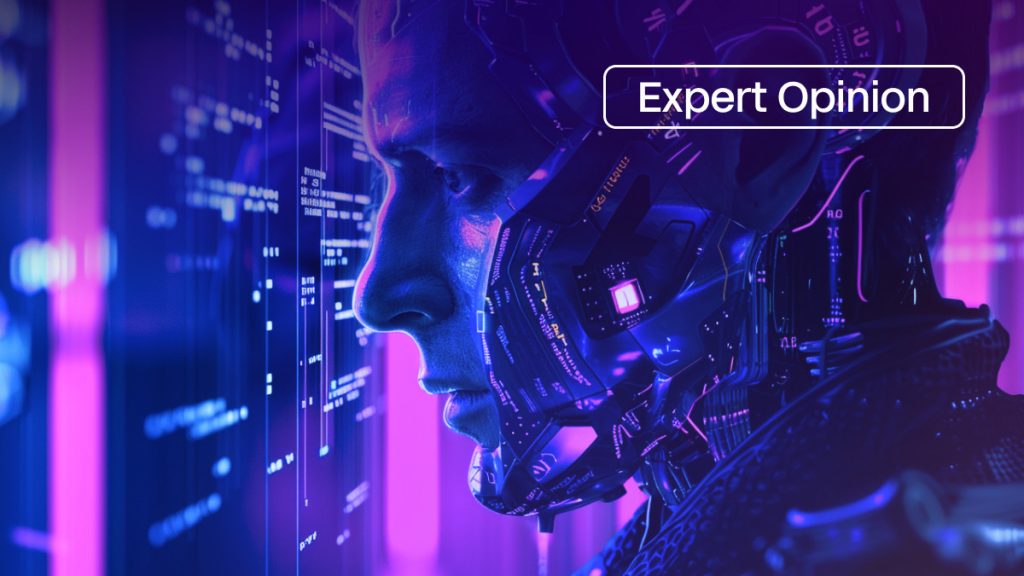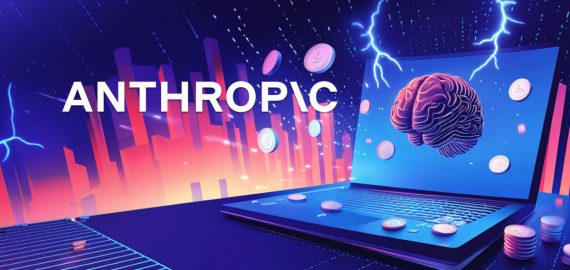How Artificial Intelligence Will Contribute to Market Transformation in 2024


In Brief
AI’s transformative potential in 2024 will accelerate market transformation, revolutionizing business operations, competition, and innovation as it advances from theory to tangible force, shaping industries worldwide.

Artificial intelligence (AI) evolved from theory to a tangible force shaping industries across the globe in just a few years. In 2024, AI will further accelerate market transformation, revolutionizing how businesses operate, compete, and innovate. Today’s article dives into the core concepts of AI, its various applications, and its transformative potential in the coming year.
What is Artificial Intelligence (AI)?
Artificial intelligence, a.k.a. AI, refers to simulating human intelligence with machines, particularly computers. These processes include:
- Learning
- Reasoning
- Self-correction.
AI algorithms can analyze vast data sets, find and recognize patterns, and make decisions or predictions with minimal human intervention.
The Origins of AI
We can trace the roots of AI back to the mid-20th century, with Alan Turing, a brilliant mathematician, often considered the father of artificial intelligence. Alan Turing’s groundbreaking work on the Turing Test and the Turing Machine laid the foundation for artificial intelligence, sparking decades of research and development.
However, despite significant advancements, AI still lacks the full range of cognitive abilities associated with human intelligence, such as theory of mind or understanding context and nuance in human speech.
Key Types of AI and How They Work
AI isn’t a single technology but rather a wide range of algorithms with different capabilities and applications. We can use several criteria to classify AI, giving us a better understanding of the available options for consumers and businesses.
Three common general classification criteria are training model, function, and capability, but many more subtypes exist.
Here’s a table summarizing the most important types of AI:
| Criteria | Types | Definition and Examples |
| Model | Machine Learning Models (ML) | Algorithms that use supervised, reinforced, or unsupervised learning to learn from data and improve over time.Examples: Spam filters and recommendation systems. |
| Deep Learning Models (DL) | Deep learning algorithms are a subtype of ML that uses artificial neural networks as models of the human brain for complex pattern recognition.Examples: Image recognition, speech recognition, natural language processing (NLP). | |
| Statistical Models | Use statistical methods to analyze data and make predictions and forecasts.Examples: Linear regression and Bayesian networks. | |
| Rule-Based Models | Follow pre-defined rules to make decisions.Examples: Early translators and early chess-playing AI. | |
| Function | Reactive Machines | React to current input, no memory of past experiences.Example: IBM’s Deep Blue that played against and beat chess Grandmaster Garry Kasparov. |
| Limited Memory AI | Uses past experiences for a limited time.Examples: Large Language Models (LLMs) like ChatGPT and Gemini, self-driving cars. | |
| Theory of Mind AI | Understand human emotions and intentions (hypothetical). | |
| Self-Aware AI | Possess consciousness and self-awareness (hypothetical). | |
| Capability | Artificial Narrow Intelligence (ANI) | Designed for a specific task.Examples: Spam filters and voice assistants with speech recognition. |
| Artificial General Intelligence (AGI) | Possesses human-level cognitive abilities (we’re close, but not quite there yet). | |
| Artificial Super Intelligence (ASI) | Surpasses human intelligence (still hypothetical). |
The AI Hype Cycle and its Real Benefits for Business Operations
AI is no longer a futuristic concept. It has gone through several peaks of inflated expectations in its hype cycle and has survived multiple throughs of disillusionment. Consultancy firm Gartner recently published the 2023 Hype Cycle for AI, showing the advancements needed for AI to reach the “plateau of productivity” and become mainstream tech.
Photo: Gartner
Fast forward to 2024, and advancements like computer vision, automatic data labeling and annotation, and intelligent applications are already here, making AI a practical tool reshaping business operations across industries. Some of the real benefits of AI, as it stands today, include:
Automating Repetitive Tasks
AI-powered robots and software handle mundane, time-consuming, and repetitive processes, leaving more strategic and creative endeavors to human workers. This automation improves productivity and efficiency, reducing the risk of human error.
Data-driven decision making
In today’s data-centric business landscape, extracting meaningful insights from vast amounts of information is paramount. AI algorithms excel at analyzing complex datasets, uncovering hidden patterns, and generating actionable recommendations.
Hyper-personalized customer experiences
AI can personalize each customer’s experience with your brand by tracking and analyzing customer behavior data. This benefit isn’t limited to online or digital businesses; it can significantly contribute to many industries.
For example, a business that sells custom frames in LA can benefit from AI-powered personalized recommendations. AI can analyze customer preferences to suggest frames that align with their tastes.
Photo: FrameStore
Furthermore, AI-powered virtual try-on tools enable customers to visualize how different frames would look with their pictures, improving the shopping experience. This transformation boosts customer satisfaction and streamlines operations, making the business more competitive.
Industries being transformed by AI in 2024
AI impacted multiple industries in 2023, and it’s transforming the market even more today. Market transformation involves significant shifts in business models driven by technological advancements.
One such technology is reverse ETL, which moves data from data warehouses to business tools in real time, ensuring that teams have up-to-date data for better decision-making.
While AI’s impact is undeniable across various sectors, 2024 is poised to be a landmark year for AI-driven transformation. Let’s dive into some key industries where AI will make significant waves:
Healthcare
AI is revolutionizing healthcare by enabling faster, more accurate diagnoses, accelerating drug discovery, and personalized treatment plans. ML algorithms can analyze medical images like MRIs, X-rays, and ultrasounds to identify subtle signs of disease that human eyes might miss. Additionally, AI is being used to design and optimize clinical trials, potentially reducing the time and cost of bringing new drugs to market.
Finance
Financial institutions like banks are turning to AI to enhance their operations. AI-powered fraud detection systems can analyze vast volumes of transaction data in real time to identify suspicious patterns and anomalies. Algorithmic trading, driven by AI models, is becoming increasingly popular in financial markets, executing trades at speeds and volumes impossible for humans.
Additionally, AI-powered chatbots are transforming customer service in the finance industry, providing instant support and personalized recommendations. With the rise of cryptocurrencies, AI has found new applications in blockchain analysis and security, mitigating risks associated with this nascent technology.
Education
The education sector is also experiencing the transformative power of AI. Personalized learning platforms leverage AI to tailor educational content and pace to individual student needs, enhancing learning outcomes and engagement.
Intelligent tutoring systems provide customized feedback and support to students, complementing the role of human teachers. AI is even being used to automate grading assignments and tests, freeing educators to focus on more meaningful interactions with students.
AI in the marketing and advertising industry
Artificial Intelligence has also revolutionized the marketing and advertising industry through highly personalized content and intelligent targeting. Marketers are using Generative AI heavily to produce text, videos, images, and other media, allowing them to craft engaging campaigns at scale.
AI’s impact on the marketing and advertising industry has been profound and swift, with both freelance marketers and agencies embracing this technology to gain competitive intelligence. Here are some key areas where AI has made a significant impact:
- Enhanced customer segmentation
- Hyper-targeted advertising
- AI-generated content
That said, even the best Generational AI models still need help with hallucinations, making the content they generate often inaccurate or contextually inappropriate. Therefore, human oversight is still crucial to ensure the material’s factual correctness and relevance.
This is where proofreading services become essential. They help refine and validate AI-generated content, maintaining high standards of quality and accuracy. Combining AI’s efficiency with human expertise ensures that innovative and reliable marketing efforts drive better results and customer engagement.
Smarter Cloud Safety with AI
In an era where businesses rely on cloud computing, cloud infrastructure, and data security have become paramount. AI is emerging as an ally against cybercriminals, offering a multi-faceted approach to enhancing cloud safety through:
- Advanced threat detection.
- Real-time incident response.
- Predictive security analytics.
As AI changes how businesses work, it’s also improving cloud security. More companies use AI in cloud apps, so keeping them secure is increasingly important. New tools called Cloud-Native Application Protection Platforms (CNAPPs) are now using AI to spot and stop threats and activities from bad actors faster.
Smart security tools like CNAPPs can help protect your AI projects and new business ideas. As you use AI to grow your business, think about how it can also make your cloud apps safer.
The Future of Work with AI
AI is not just transforming industries; it’s also reshaping how we work. As AI capabilities advance, businesses re-evaluate their workforce needs and skill sets to remain competitive. This re-evaluation implies:
- Using collaborative AI tools: Businesses increasingly use AI to augment human capabilities, not replace them.
- Reskilling and upskilling: Businesses are investing in reskilling and upskilling programs to ensure their workforce acquires the AI skills they need to remain competitive.
Photo: Coursera
- Considering the ethics of AI in the workplace: As AI takes on more complex tasks, ethical considerations become increasingly important.
Challenges and Limitations of AI
While AI’s potential is immense, it’s important to acknowledge its challenges and limitations.
Data privacy and security
Most AI systems rely on large data sets to function effectively. That data comes mostly from the web or user input, raising concerns about data privacy. Sensitive personal and business information could be at risk if not adequately protected. Robust data governance and security measures ensure we use AI ethically and responsibly.
Algorithmic bias
An AI algorithm is only as good as the data you use to train it. If the training data is biased, AI models can perpetuate and amplify those biases. This problem is called algorithmic bias and can lead to discriminatory hiring, lending, and criminal justice outcomes.
Addressing algorithmic bias through careful data curation, diverse training datasets, and ongoing monitoring of AI systems is crucial.
The “Black Box” Problem
We often refer to many AI models, particularly deep learning models, as “black boxes” because their internal workings and decision-making processes are challenging to interpret. This lack of transparency can be a problem, especially in high-stakes situations where understanding the rationale of AI decisions is critical. Ongoing research focuses on developing more explainable AI models to address this issue.
Energy Use
Training Generative AI and machine learning models require hundreds of hours of computing using some of the world’s most advanced computers. While this is done only once for every model, companies like Google and OpenAI constantly develop and train newer models with even more data.
Furthermore, as this video explains, running a prompt on any generative model consumes a lot of energy, driving up carbon emissions and straining the power grid.
AI’s Transformative Power: A Glimpse Beyond 2024
In 2024, AI will continue reshaping markets, industries, and the very fabric of our daily lives. AI’s impact will be felt far and wide, from revolutionizing healthcare with personalized medicine to optimizing supply chains with intelligent logistics.
As businesses adopt and integrate AI into their operations, we can expect a wave of innovation and disruption across various sectors. Challenges and limitations remain, but AI’s potential benefits are too significant to ignore. By embracing AI responsibly and ethically, we can use its power to create a more efficient, equitable, and brighter future for all.
Disclaimer
In line with the Trust Project guidelines, please note that the information provided on this page is not intended to be and should not be interpreted as legal, tax, investment, financial, or any other form of advice. It is important to only invest what you can afford to lose and to seek independent financial advice if you have any doubts. For further information, we suggest referring to the terms and conditions as well as the help and support pages provided by the issuer or advertiser. MetaversePost is committed to accurate, unbiased reporting, but market conditions are subject to change without notice.
About The Author
Jeremy Moser is the co-founder and CEO of uSERP, a leading digital PR and SEO agency. With a keen focus on driving organic growth and increasing online visibility, Jeremy has built a reputation for delivering impactful results in the digital marketing space. In addition to running uSERP, Jeremy is also an entrepreneur in the SaaS industry, where he buys and builds companies like Wordable.io. His deep expertise in SEO and content marketing is reflected in his work as a writer for notable publications, including Entrepreneur and Search Engine Journal, where he shares expertise on scaling businesses, growth strategies, and digital marketing trends.
More articles

Jeremy Moser is the co-founder and CEO of uSERP, a leading digital PR and SEO agency. With a keen focus on driving organic growth and increasing online visibility, Jeremy has built a reputation for delivering impactful results in the digital marketing space. In addition to running uSERP, Jeremy is also an entrepreneur in the SaaS industry, where he buys and builds companies like Wordable.io. His deep expertise in SEO and content marketing is reflected in his work as a writer for notable publications, including Entrepreneur and Search Engine Journal, where he shares expertise on scaling businesses, growth strategies, and digital marketing trends.


















































